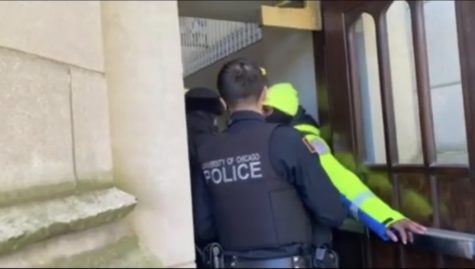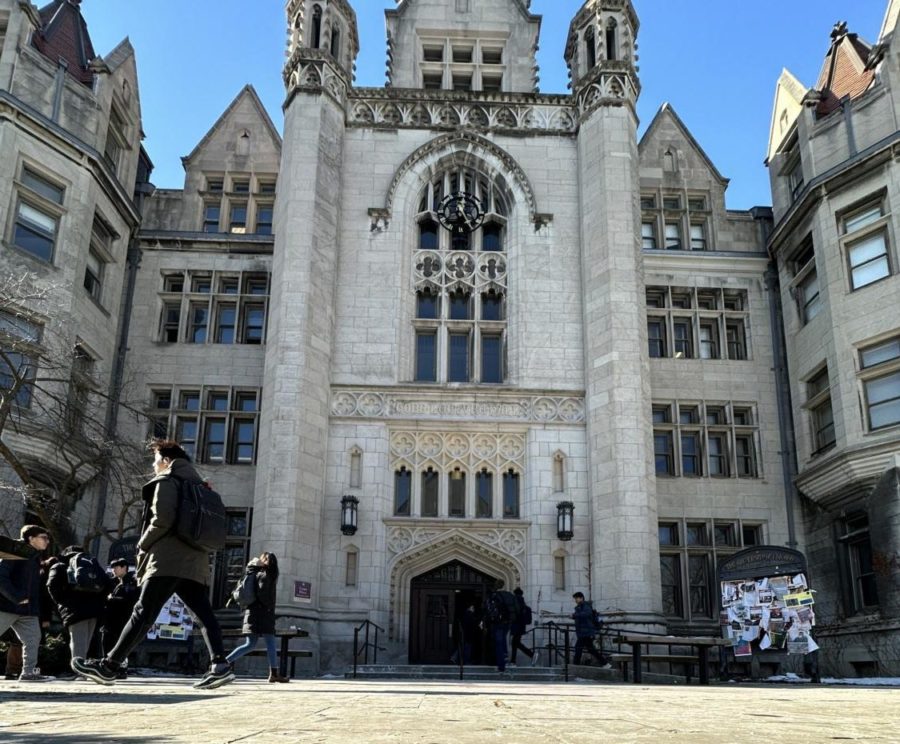SJP Condemns University Response to Protest as a Sign of Bias
“We can confidently say that students were within their right to protest but treated as guilty and purposely obstructed by administrators and UCPD throughout the action,” an SJP member said.
A photo of Cobb Hall.
February 9, 2023
In an online post and statements to The Maroon, organizers from Students for Justice in Palestine (SJP) condemned the University’s alleged obstruction of a protest in front of Cobb Hall this past Thursday.
Footage of the demonstration shared with The Maroon by SJP organizers showed multiple scenes from the protest in front of and outside Cobb Hall on February 2. In one clip, a University safety ambassador denies protestors entrance into Cobb Hall.

Another clip showed a campus safety ambassador opening an alarmed door to allow University of Chicago Police Department (UCPD) officers to enter Cobb Hall. SJP organizers claim that the University’s Dean-on-Call then told demonstrators to leave the building, citing that alarm.
“The few of us in the front collectively recall the dean saying something vague to stop and discourage us from moving in after the alarm went off,” read a statement from SJP.
In a statement to The Maroon, the University said, “The protesters this morning were not prevented from entering Cobb Hall. They entered the building after a brief delay of under three minutes, which allowed time for a Dean-on-Call to speak with them.” The statement went on to reiterate the University’s commitment to freedom of expression.
“As part of our commitment to free expression, the University is fundamentally committed to upholding the rights of protesters to express a wide range of views,” said the statement.
SJP’s demonstration protested a course called “Security, Counter-Terrorism, and Resilience: The Israeli Case,” taught by Meir Elran, a veteran brigadier general in the Israeli military, and sought to raise awareness about the deaths of 10 Palestinians in the Jenin Refugee Camp. The action on Thursday was not the group’s first protest of Elran’s class, but it was the first to be promoted on the group’s social media page before it began.
The presence of security personnel at protests is not uncommon. However UCPD officers and the University’s security ambassadors do not usually confront or interact with demonstrators.
The University told The Maroon, “Deans-on-Call are often present at and monitor protests, demonstrations, and other events on or adjacent to University property. The Department of Safety & Security was aware of the planned protest and officers were present as is customary for protests on campus. Officers were not present at the request of the Dean-on-Call.”
However, SJP contends that the actions taken by the University were beyond what is normally done and demonstrates a bias against the group.
“We can confidently say that students were within their right to protest but treated as guilty and purposely obstructed by administrators and UCPD throughout the action.”
When recounting the conversation with the Dean-on-Call, a SJP member said, “These so-called security explanations [the Dean-on-Call] was giving were after-the-fact rationalizations. She acknowledged that we followed the rules and also that they didn’t have any justification for denying us entry in the first place. She acknowledged none of this should have happened.”
After the protest, SJP members claimed that a protester attempting to re-enter the building in order to retrieve their belongings was stopped by the Dean-on-Call, who said protestors could not re-enter without showing their ID and being escorted by an officer.
The University maintains that no student was stopped from entering Cobb without justification.
In a later statement to The Maroon, the University wrote, “Per University policy, ‘Individuals occupying University spaces or using University resources should understand that on occasion they may be asked to show identification or their ChicagoCard to a University employee whose role includes insuring [sic] that only authorized individuals are present on University property or in facilities operated by the University, or that only authorized individuals are using certain University resources. If asked by such a University employee to show identification, UChicago ID carriers are required to show their card.’”



